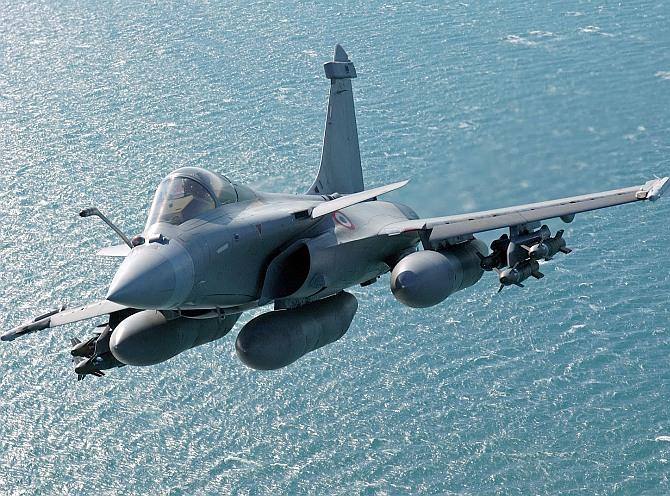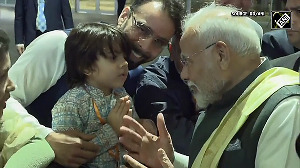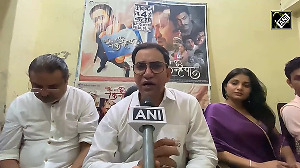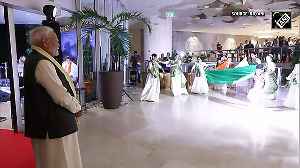
The Rafale deal will bring a sea change in India's defence preparedness, says Claude Arpi.
Nine years ago, the United Progressive Alliance government announced its decision to cancel the process for purchasing 197 helicopters for the army from the European consortium Eurocopter.
An official defence ministry communiqué gave no reason, merely stating: 'The government has decided to cancel the ongoing request for proposal (RFP) for procurement of 197 helicopters for the Indian Army. A fresh RFP will be issued shortly.'
Quoting 'sources', the media conjectured that the negotiations were terminated because of 'major deviations in the approved parameters of the helicopter and procedures.' Eurocopter had emerged as the front-runner for the deal after years spent on tenders and trials (the only competitor in the race for the deal was Bell, the American firm).
During the last couple of years, many analysts thought the same fate could await the Rafale deal. It seems that may not be the case.
French Defence Minister Jean Yves Le Drian, accompanied by Eric Trappier, chairman, Dassault Aviation and his colleagues, will arrive in Delhi on Thursday, September 22, and the 7.87 billion Euro deal (about Rs 59,000 crore) for 36 Rafale fighter jets will be signed on Friday, September 23.
The basic cost, armaments, offsets and service value have been finalised a few days ago; it was included in a several-thousand pages Inter Governmental Agreement.
It is the end of a long saga which started in 2001.
A long story which could have been shorter
One can always say 'all is well which ends well,' but the fact remains that the process has been much too long. This point should not be brushed aside, because ultimately it is the Indian Air Force which has suffered. Hopefully this issue will be looked into by the ministry of defence and the Prime Minister's Office.
With two hostile fronts (Pakistan and China), India can't afford to be ill-prepared just because of political and bureaucratic slackness or worse.
Let us look at the 15-year long process: India is probably the only country in the world which has such a cumbersome system for defence procurement (it took three months for Egypt to buy 24 Rafales).
While the initial Request for Information for 126 Medium Multi-Role Combat Aircraft was issued in 2001, the Request for Proposal was only publicised in 2007. This is when the 'complications' started.
In January 2012, after a long competitive process which lasted five years, in which the American F/A-18 and F-16, Russian MiG 35, European Eurofighter and Swedish Saab Gripen participated, Dassault and its partners Thales and Safran were selected to supply 126 planes to the IAF.
Of the 126, 18 planes were to be manufactured by Dassault in France, while the remaining 108 planes were to be built in India, under a large Transfer of Technology agreement, by Hindustan Aeronitical Ltd.
Soon several disagreements cropped in; the transfer of technology was probably too ambitious. Further, Dassault was not ready to take 'full responsibility' for the 108 fighters to be manufactured in India by HAL.
The negotiations had reached an impasse, when in a masterstroke Prime Minister Narendra Modi unlocked the situation.
On April 9, 2015, an Indian delegation arrived in Paris ahead of the prime minister and the French side was informed of Delhi's decision to purchase 36 planes 'off-the-shelf'. It was a pragmatic move.
While dropping the MMRCA framework, India considered primarily the IAF's 'critical operational necessity'.
On January 25, as President Francois Hollande landed in Delhi to participate in the Republic Day celebrations the next day, Defence Minister Manohar Parrikar and Le Drian signed a MoU for the purchase of 36 Rafale aircraft.
During the joint press conference at Hyderabad House, Hollande said the 'real' deal would be inked 'dans les jours prochains (in the coming days).'
The 'coming days' became nine months.
One French official involved stated: "With India, we know that we have to learn patience." The IAF was patient too.
Nobody can deny that many 'forces' did not want the deal to happen.
Just to give one example, in 2014, the Russian Ambassador to India, Alexander Kadakin, declared: 'We (Russia) are still very surprised that Rafale is being bought, because if the Rafale is intended to oppose Pakistani or Chinese planes, these Rafales will be like mosquitoes on an August night. That's why I don't understand why...'
He was obviously batting for the Sukhois.
The propaganda within India has sometimes been ferocious, but once the Modi government opted to go for the 'off-the-shelf' option, it tried hard to get the best of it. It resulted in delay, the 'coming days' became months, but at the end the deal could be a game changer for the IAF (and India).
The good news
The positive outcome of the delay has been the offset clause.
Initially, Dassault Aviation and its partners were only ready to reinvest 30 per cent of the value of the contract in India to meet its offset obligations.
After Modi spoke personally to Hollande in September 2015, the French side finally accepted to reinvest 50 per cent of the value of the deal.
One of the most interesting offers came from Safran, one of the partners in the Rafale deal, which could help India revive the unsuccessful Kaveri engine project.
The French company is ready to invest 1 billion Euro (about Rs 7,500 crore) by 2020 to revive India's combat jet engine project through a joint plan for the 'Kaveri' gas turbine powering the indigenous Tejas fighters.
According to The Economic Times: 'The proposal is to use offset credits that would come from the planned Rafale fighter jet deal to revive the indigenous jet engine project.'
Those involved in talks are the MoD, the Defence Research & Development Organisation and French companies.
The same source explained that since January, 'Several rounds of discussions have taken place between Indian authorities and Safran, which developed the M88 engine that powers the Rafale as well as the Shakti engine for Indian advanced light helicopters.'
The offsets clauses need to be fulfilled by French companies Safran, Thales, MBDA and Dassault Aviation, all participating in the Rafale project.
The Scorpene scam
Incidentally, the 22,000-page leaked data from the Scorpene submarine built with French DCNS technology which contained information on different aspects of the ship including its underwater sensors, above-water sensors, combat management system, torpedo launch system and specifications, communications and navigation systems, has not been taken into consideration at the time of finalising the Rafale deal, though Thales is part of both projects. It shows the maturity of the negotiators.
It does not mean that the issue should not be looked into by India and France; it will have to. Let us remember that six Scorpene submarines are being constructed at Mumbai's Mazgaon Dockyard at a cost of $3.5 billion (about Rs 23,400 crore).
An old precedent
On October 26, 1953, H S Malik, the Indian ambassador in Paris, sent a personal telegram to Jawaharlal Nehru. Dassault had just delivered the first Ouragans fighter planes (known as Toofanis in India).
Malik wrote: 'I venture to bring to your notice the wonderful cooperation that we have received both from the French officers of the ministry of defence, from the cabinet minister downwards, and from the French industry.'
The contract had been signed in June 1952. The ambassador continued: 'Already four planes have reached India; another 35 are being sent on October 30 on the aircraft carrier DIXMUDE, and the remainder 32 aircraft, will be dispatched in January 1954.'
Nehru is told by Malik: 'I think you will agree that this is indeed prompt execution of the agreement as embodied in the contract between us and the French. This agreement is being carried out both in the spirit and in the letter and there has been no instance of any attempt to delay or obstruct.'
'Our pilots who came here to learn to fly this type of aircraft, which was new to them, won the admiration and respect of the French air force and, generally speaking, the other members of the Indian Air Force who have come to France for the requisite training to enable them to carry out the servicing of this aircraft in India have, in spite of the language handicap, applied themselves with energy and devotion to their task and have made friends and won the respect of the people among whom they have lived.'
One can only hope that despite the several hiccups during the negotiations, the new collaboration between France and India will be as harmonious as 63 years ago.
If all goes well, the collaboration should be even more fruitful, partly due to the offset clauses.
In any case, the planes, for which delivery will start in two or three years, should bring a sea change for India's defence preparedness.
Eventual adversaries are warned.











